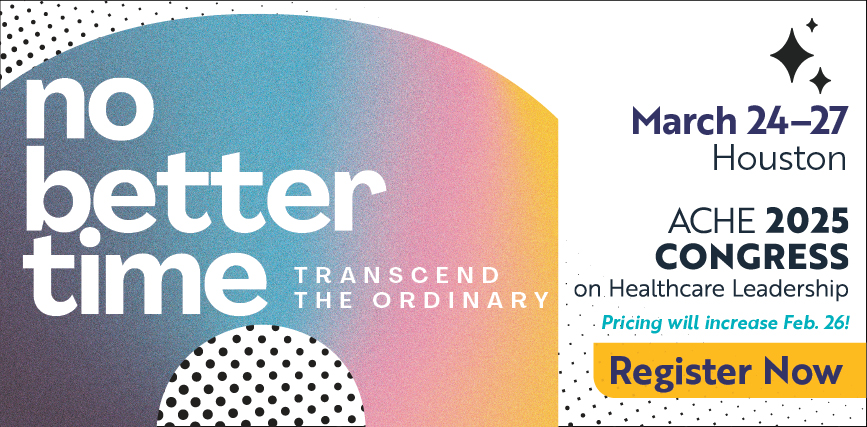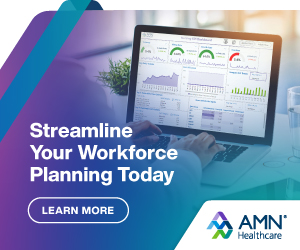A Forward-Thinking Approach to Financing Capital Equipment
Due to current economic conditions, healthcare executives must find innovative ways to protect the financial health of their institutions.

- Workplace Satisfaction Rooted in Respect
- Building Meaningful Relationships Through Networking
- Mentor/Mentee Relationships Offer Reciprocal Benefits
- Healthcare Real Estate Trends to Watch
- IHF Calling for Award Entries
- Catalyst to Transform Your Career Trajectory
Workplace Satisfaction Rooted in Respect
Across industries, researchers have found that feeling respected at work is the single strongest predictor of how employees describe an organization’s culture. Unfortunately, only 74% of healthcare workers feel respected at work according to a study of healthcare professionals by researcher Katherine A. Meese, PhD.
While that is a solid number, Meese sees room for improvement. “Letting people know that a respectful and supportive workplace is a priority for you is a huge trust-builder,” she writes in her book The Human Margin: Building the Foundations of Trust,. Meese recently addressed this topic at Montana Health Association’s annual conference, where she served as keynote speaker.
Meese identified organizational and team strategies that healthcare leaders can use to optimize employee satisfaction and retention, noting the importance of staff recognition and rounding. Pulling from her latest research, she illustrated how organizational support and trust in leadership were two keys to improving employee retention, potentially alleviating workforce shortages.
Meese has developed a series of actions, words and tools that healthcare leaders can use to create, improve and sustain trust—according to evidence-based strategies.
Meese is one of dozens of expert ACHE Faculty members, who travel to hospitals and health systems across the country to present in-person, customizable and cost-effective learning opportunities for staff.
Learn more about Meese's topic, as well as Customized Learning for Organizations programs that ACHE offers for your leadership team onsite. For more information, email Martijn van Oort, director, business development, ACHE Learn.
This item was corrected Feb. 25
Building Meaningful Relationships Through Networking
It can be intimidating to walk into an event unsure of how to make a first connection. However, preparation and understanding can remove the uncertainty and spark meaningful relationships and career growth.
Adrian Parker, FACHE, executive director, division of strategy and innovation, Broward County (Fla.) Public Schools, started his networking journey by sticking to familiar faces and avoiding new connections. Today, he’s focused and intentional bonding with people who are aligned with his career goals and now approaches events with intent. Kadija Moody, administrative fellow, Boston Medical Center, has stepped out of her networking comfort zone, creating clear goals and follow-up plans, engaging intentionally and exploring diverse networking environments.
Understanding your networking style can help you navigate events more effectively. In “Networking: The Hello Before the Hello,” featured on the ACHE Blog, Parker and Moody discuss the most common obstacles to effective networking, different approaches to networking and follow-up techniques.
“Networking is more than a series of hellos,” they write. “It’s about fostering relationships that can shape your career and personal growth.” Prepare for your next event by understanding your networking style and identifying areas where you can improve—instead of attempting to meet as many people as possible.
Mentor/Mentee Relationships Offer Reciprocal Benefits
While mentoring relationships often focus on the growth of the mentee, most connections are mutually beneficial. Mentors benefit by staying attuned to issues across the career continuum, exercising leadership skills and strengthening interpersonal and coaching competencies beyond their organization. Mentees, on the other hand, have the chance to clarify long-term career goals, enhance executive presence or sharpen their leadership skills.
“I've enjoyed mentoring … because it has given me the chance to share my knowledge and expertise to make a positive impact,” says Kenneth Wong, FACHE, healthcare consultant and adjunct faculty, Nova Southeastern University, Ft. Lauderdale, Fla. “The exchange of ideas and experiences during mentoring sessions cultivates a dynamic learning environment that benefits both mentor and mentee.”
An exclusive ACHE member benefit, the Leadership Mentoring Network provides strategic matching and support for successful mentor partnerships. Formal programming lasts six months, although many partnerships carry on beyond the formal timeline. Operating two cohorts per year, this mentoring network’s spring cohort application deadline is Monday, March 31.
ACHE Fellows and healthcare leaders with a minimum of five years of experience at the director level or higher are invited to apply to become a mentor through the Leadership Mentoring Network. To learn more about the numerous benefits of becoming a mentor, read this ACHE blog post and or see this “Careers” column from the November/December 2021 issue of Healthcare Executive. Visit the Mentor Network website to learn more about the Leadership Mentoring Network and to complete your mentor or mentee profile.
Healthcare Real Estate Trends to Watch
The healthcare landscape is poised for significant transformation this year. JLL’s 2025 Healthcare Real Estate Trends to Watch report identifies four key trends shaping healthcare organizations' real estate and workplace strategies:
- Strategic footprint management: Health systems are reevaluating their real estate footprint, balancing cost-optimization with expansion. While increasing real estate budgets and headcount, they're also prioritizing space utilization. Administrative spaces offer optimization opportunities, potentially freeing hospital facilities for patient care and revenue generation.
- Technology-driven transformation: Advancements in healthcare technology are shifting care from inpatient to outpatient settings, increasing the acuity of medical outpatient buildings and necessitating upgrades to building systems and digital infrastructure. AI and technology can also streamline commercial real estate processes like lease administration and facilities management.
- Employee-focused design: With nearly a quarter of healthcare employees considering leaving their positions, organizations are focusing on creating quality workplaces that contribute to employee well-being, according to JLL research. Improvements in areas such as safety, maintenance, sound privacy and nutrition correlate with intent to stay.
- Strategic partnerships and upskilling: The increasing complexity of healthcare is driving providers to form more strategic partnerships with real estate experts and invest in technology for scenario analysis. Healthcare companies are prioritizing the upskilling of their real estate teams.
By embracing technology, prioritizing employees and leveraging partnerships, health systems can optimize costs while improving patient care and efficiency.
JLL, an ACHE Premier Corporate Partner, provided the content above.
IHF Calling for Award Entries
The International Hospital Federation is accepting entries for the 2025 IHF Awards, including ACHE’s American College of Healthcare Executives Excellence Award for Leadership and Management.
Hospitals and health service providers have until May 2 to submit entries that demonstrate outstanding projects, programs and services in one of seven categories:
- Dr. Kwang Tae Kim Grand Hospital Award.
- Dr. Prathap C. Reddy Excellence Award for Clinical Quality and Patient Safety.
- American Hospital Association Excellence Award for Healthcare Workers' Wellbeing.
- Mastercard Award for Hospital Operational Excellence.
- American College of Healthcare Executives Excellence Award for Leadership and Management.
- Ashikaga-Nikken Excellence Award for Low-Carbon Healthcare.
- Seddiqi Holding Excellence Award for Social and Environmental Responsibility.
Launched in 2015, the IHF Awards honor excellence in hospitals and healthcare organizations around the world. Awards will be presented to the winners during a ceremony at this year’s World Hospital Congress, Nov. 10–13 in Geneva, Switzerland. Visit the IHF Awards webpage to learn more. Inquiries can be directed to: awards@ihf-fih.org.
Catalyst to Transform Your Career Trajectory
With an immersive curriculum, ACHE’s Executive Program provides a catalyst that can transform your career. Among the benefits are individualized coaching sessions and the chance to visit some of the nation’s top healthcare institutions.
Led by expert faculty, this year’s Executive Program includes three in-person modules (June 8–10 in Houston; Aug. 10–12 in Chicago; and Nov. 2–4 in Nashville) and intermittent virtual education sessions, each featuring resources and discussions that deliver insights on topics relevant to specific challenges healthcare leaders face.
The program is also divided into three cohorts to accommodate the career path for each type of professional: executive, senior executive and clinical executive. And each module features different approaches to satisfy a variety of learning styles, along with plenty of networking opportunities.
Participants are eligible to earn up to 30 ACHE In-Person Education credits and 6 ACHE Virtual Interactive Education credits, as well as interprofessional continuing education credits. A limited number of scholarships, provided by ACHE’s Fund for Healthcare Leadership, are available for individuals whose organizations lack the resources to fully fund their tuition. The scholarship application deadline is April 4.
Register and learn more. Also, attend an upcoming complimentary informational webinar on March 3 or April 1, which will include a live question-and-answer period.



